More and more consumers are seeking to avoid products from “factory farms”—where animals are kept in abysmal conditions. Such consumers often look for animal-raising claims on packaging labels that purport to indicate higher-welfare conditions. Unfortunately, there is precious little oversight and standardization of label claims such as “free range” and “humanely raised,” and well-meaning consumers can easily be deceived by industrial producers using such terms as a hollow marketing ploy.

AWI first published A Consumer’s Guide to Food Labels and Animal Welfare more than a decade ago. Each year, new labels are added as producers respond to growing consumer interest in higher-welfare, sustainable food. The 2023 update to the guide includes new animal welfare and environmental stewardship label claims now appearing on meat, poultry, and egg products.
Regeneratively Raised
As corporate agribusiness has taken control over a significant portion of organic agriculture, animal welfare and environmental advocates have embraced a more sustainable system, known as regenerative farming. Regenerative farming nurtures and restores soil health and protects water resources and biodiversity. In addition, regenerative animal welfare standards typically exceed not only those of conventional agriculture but also the welfare standards applied to much of organic agriculture. While “regenerative” claims are starting to show up on a variety of food products, the US Department of Agriculture has not established a definition for “regenerative,” “sustainable,” or similar claims, nor does it have a set of independent standards for certifying products with these claims. The USDA merely verifies that the producer has met its own standards based on its own definition of the term. Because these claims may be used in a meaningless or misleading manner, AWI recommends regenerative claims that are certified by an independent third party, such as Regenerative Organic Certified.
Slow Growth
Claims related to animal growth rates are now appearing on packages of poultry—chicken meat, in particular. Research has demonstrated the animal welfare benefits of using breeds that grow at a slower rate than conventional poultry breeds. According to the USDA, producers using claims such as “slow growth” or “heirloom” must provide documentation concerning the specific breed and its “grow out” time from birth to slaughter in comparison to conventional breeds. However, AWI is concerned that the USDA may not possess the scientific resources needed to assess use of the growth speed claims and supports using maximum daily weight gain instead of age at slaughter to determine eligibility. AWI endorses the claim when it is verified by a third-party certification program that is rated as a “best choice” or “next best choice” in our guide.
Even as AWI helps consumers develop a deeper understanding of the terms and certifications found on food labels, we are calling on the USDA to crack down on deceptive animal-raising claims. So long as deceptive and unverified claims are allowed, however, A Consumer’s Guide to Food Labels and Animal Welfare can help consumers discern which claims to trust and which to question.